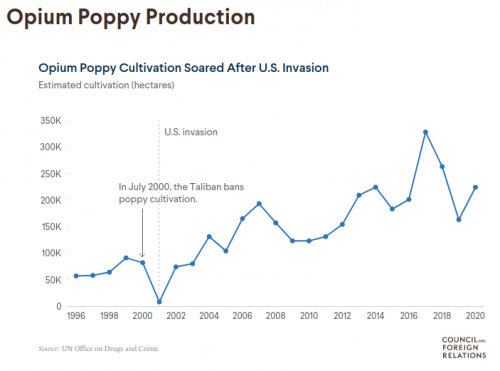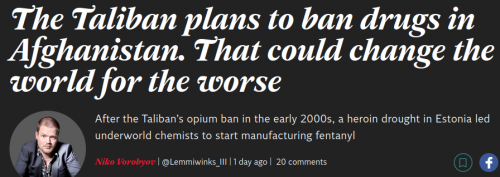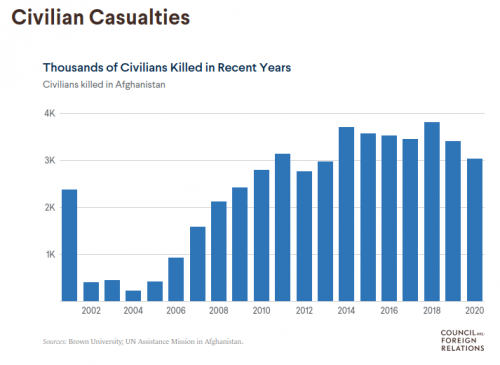Media suddenly discovers that Afghanistan is a narco-state
The news media has discovered something extraordinary: A whole bunch of opium is grown in Afghanistan. Who knew?
The media is shocked! Shocked I say!
The CIA and our late Afghan puppet government are as surprised by this development as those in news media.
It seems that no one knew about this except for the Taliban.



Fortunately, this can all be blamed on the Taliban.

And do you know what those dastardly Taliban plan to do about it? They plan on making the situation even worse by banning opium. Can you believe that?

The only thing worse than this brand-new narco-state, that totally didn't exist a few months ago, is for the Taliban to get rid of all that poisonous opium.
It seems the Taliban can't do anything right.
It would be so much better for the Afghan people if we just went back to the way it was last year, amirite?



Comments
Watching/reading the MSM makes Americans
the stupidest, most ill-informed people on the planet.
There goes the neighborhood!
No more opium fields, no more work. Fields turned into actual crops to feed people, perhaps? Such a disgrace.

"The “jumpers” reminded us that one day we will all face only one choice and that is how we will die, not how we will live." Chris Hedges on 9/11
I used to follow the issue closely
Because a lot of the villages where I knew people on the Lao/Burma border grew opium as a cash crop and the money changer at the market would buy it. When the price per kilo went up it could almost double a families income. A kilo is about what a family could produce.
They weren't obsessed with growing, but it was one of the few things they could use to buy medicine, spices, flints for black powder rifles, gasoline for generators, heck T shirts and flip flops for the kids. They were way off the road.
Opium has a pretty good shelf life, they could hang onto it until they needed money. Plenty of people were addicts but mostly old folks, the kids drank white liquor.
When the Taliban cut production the price jumped from $500 to $2,000. Huge increase. At about that time anti malarials became widely available, and also unfortunately the US in cooperation with the Lao govt began making all drugs illegal, pot, opium etc. For the first time there was a death penalty for high volume smuggling (mostly from Burma across Laos to Vietnam and out to the world). Soon Lao production fell to a few hundred metric tons per year.
I hope the Taliban does outlaw opium, it's a dirty business. Of course there's now worse, meth and fentanyl.
'the media' just inhaled or digested too much of the 'narcos'
and were floating in 'narco heaven'.
https://www.euronews.com/live
US-UK instrumentalization of the opium trade has a long history
https://nationalinterest.org/blog/reboot/opium-war-conflict-changed-chin...
The story of opium set to music
Nothing new, really.